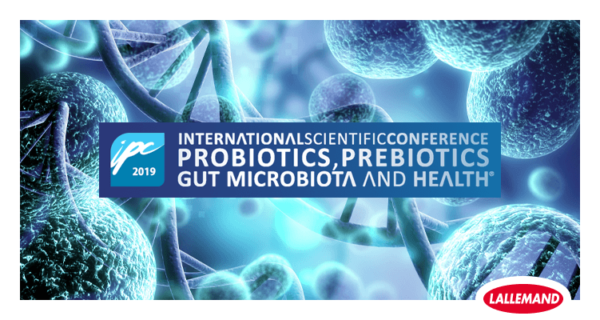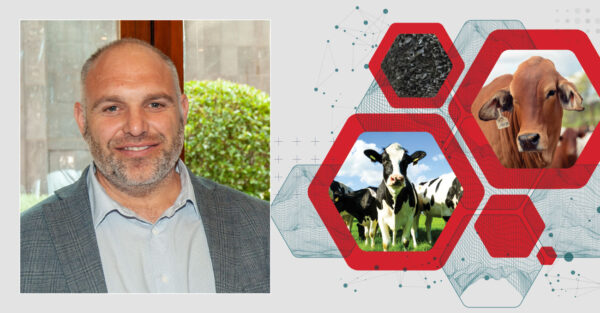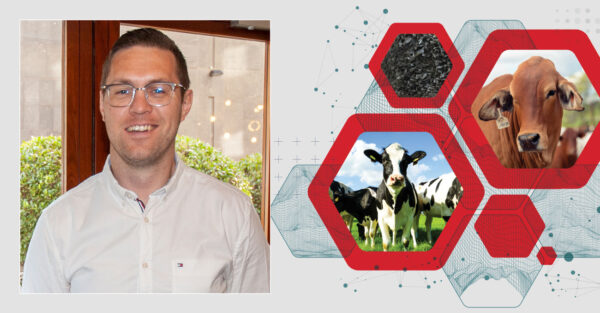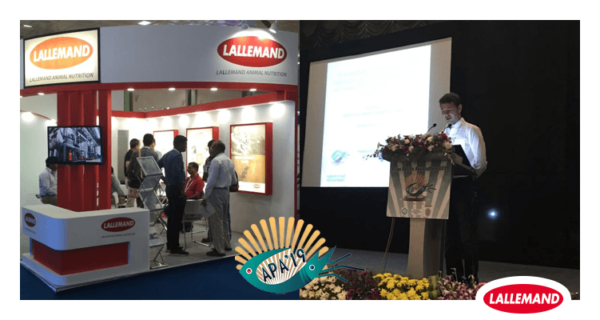News | Reading Time 4 minutes
Lallemand strengthens its Centers of Excellence team
We are adding new talents in OMICS technologies and bioinformatics to cover microbiota research for all species
Recently, new people have joined the Lallemand Animal Nutrition Centers of Excellence teams, adding talent to ruminant, forage, and monogastric fields.
With these new hires, the Centers of Excellence will cover Lallemand Animal Nutrition’s major markets as well as new and emerging markets such as the pet food industry.
 Ana Rodiles, Ph.D., has joined the Monogastric Center of Excellence as a senior scientist. In this position, Ana will lead bioinformatics analysis trials on pets, fish, shrimps, and horses and will actively participate with research and development in these fields. In addition, she will ensure scientific intelligence in the field of bioinformatics to develop and test new models and will train both research and marketing teams.
Ana Rodiles, Ph.D., has joined the Monogastric Center of Excellence as a senior scientist. In this position, Ana will lead bioinformatics analysis trials on pets, fish, shrimps, and horses and will actively participate with research and development in these fields. In addition, she will ensure scientific intelligence in the field of bioinformatics to develop and test new models and will train both research and marketing teams.
Ana holds a master’s degree in aquaculture and a doctorate in fish nutrition from the University of Cadiz (UCA, Spain). She conducted postdoctoral research on fish gut microbiota at the University of Plymouth (PU, UK), enabling the implementation of bioinformatics analysis. During her scientific carrier, Ana worked with massive data analysis of the microbiome of more than 15 animal species and published 35 peer-reviewed papers. Finally, she jumped into applied sciences in farming animals working as a gut microbiota researcher for a Dutch company for two years before joining Lallemand.
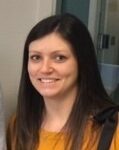 Laurie Guillot joined the Ruminant Center of Excellence based at UMR MEDIS, INRAE Rhône Alpes Auvergne-University of Clermont Auvergne as a research project leader. Laurie will lead some research projects applying molecular biology-based approaches — OMICS — to document the mode of action of Lallemand Animal Nutrition products and will develop new methods and models.
Laurie Guillot joined the Ruminant Center of Excellence based at UMR MEDIS, INRAE Rhône Alpes Auvergne-University of Clermont Auvergne as a research project leader. Laurie will lead some research projects applying molecular biology-based approaches — OMICS — to document the mode of action of Lallemand Animal Nutrition products and will develop new methods and models.
Laurie holds a master’s degree in microbiology. She has worked for four years as an engineer at INRAE where she researched the human gut microbiota. She has strong experience in anaerobic microbiology, molecular biology methods, and the use of animal models like gnotobiotic rodents.
 Richard Scuderi has joined the Forage Center of Excellence in Chazy, N.Y. (USA). Richard will lead some innovative research projects applying OMICS technologies to characterize Lallemand Animal Nutrition bacteria strains and investigate the application of forage inoculants during ensiling and their subsequent animal performance during feedout.
Richard Scuderi has joined the Forage Center of Excellence in Chazy, N.Y. (USA). Richard will lead some innovative research projects applying OMICS technologies to characterize Lallemand Animal Nutrition bacteria strains and investigate the application of forage inoculants during ensiling and their subsequent animal performance during feedout.
Richard holds a master’s degree in animal science from the University of Vermont. Prior to joining Lallemand Animal Nutrition, he acted as the director of dairy nutrition and quality assurance for Mercer Milling Company in Liverpool, N.Y., for two years. He has also conducted research at the University of Vermont’s College of Agricultural and Life Sciences, Animal & Veterinary Sciences Department, Burlington, Vt.
About Lallemand Centers of Excellence
Lallemand Animal Nutrition established partnerships with research entities around the world to develop Centers of Excellence and satellite collaborations to Forward the development and innovation of microbial solutions. The Centers continuously document the biology, mode of action, and benefits of existing yeast and bacteria strains dedicated to animal nutrition. The partnerships also search for microbial solutions and future applications to support sustainable animal production.
The Centers of Excellence are divided into three different sub-centers for the permanent employees and doctoral and post-doctorate studies with students.
The three permanent Centers of Excellence:
- Ruminant Center of Excellence in Theix, France, and satellite collaborations in Canada and Europe, dedicated to research on ruminant microbial ecosystems, product development, and applications for beef, dairy, and small ruminants. The research conducted covers all aspects of the rumen and lower gut microbiota — from its establishment, its evolution, down to its function, and internal or external interactions with feedstuffs or other microbes.
- Forage Center of Excellence in Chazy, N.Y., USA, with satellite collaborations in Europe, is committed to research and development for improving forage fermentation, management, and safety. The research conducted covers silage microbial ecology, screening for new active ingredients, and supports the validation of new technologies.
- Monogastric Center of Excellence with research staff in Toulouse, France, and Spain dedicated to research on digestive microbial ecosystems and product development and applications for swine, poultry, pets, and aquaculture. The researchers have access to advanced OMICS technologies from the hosting institutes and research all aspects of lower gut microbiota and intestinal health.
Published Jul 8, 2020 | Updated Jan 16, 2024
Related articles
Need specific information?
Talk to an expert